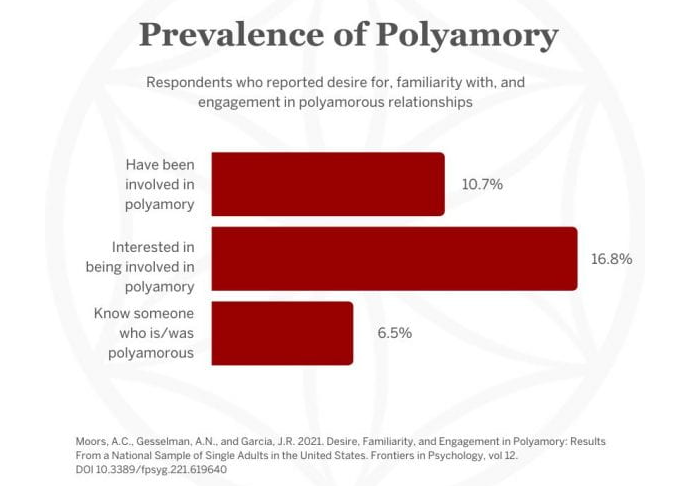Am I Polyamorous Quiz: One Heart, Many Loves?
○ DISCLAIMER
The quizzes and content on this website are designed for entertainment purposes only and should not be used as a basis for making personal decisions about your sexuality, gender identity, or any other life choices. These quizzes are not diagnostic tools and cannot determine your identity or orientation. If you're questioning your identity or need support, we strongly encourage you to seek guidance from qualified LGBTQ+ friendly professionals or counselors. Remember that your journey of self-discovery is unique and personal to you.

Imagine that love is not a pie that runs out when you cut too many slices. What if it’s more like a candle flame, capable of lighting many other candles without losing its brightness? This is precisely the question that begins many people’s journey into the world of polyamory. And if you’re here, perhaps this question is already whispering in your ear.
The “Am I Polyamorous?” quiz is not just a set of checkboxes. It’s a mirror that reflects your deepest beliefs about love, jealousy, intimacy, and freedom. But before looking into this mirror, let’s understand what we might see there.
What is Polyamory?
Polyamory is not simply “many loves” in its literal translation from Greek and Latin. It’s an entire philosophy of relationships built on the possibility of experiencing romantic feelings for several people simultaneously – openly, honestly, and with the consent of all participants.
Unlike secret affairs or “open relationships for sex,” polyamory is built on the foundation of ethical non-monogamy. This means all partners know about each other, give informed consent, and actively work to create healthy relationship dynamics.
Neurobiologist Helen Fisher in her research identifies three independent brain systems responsible for love: lust, romantic attraction, and attachment. In polyamorous people, these systems can activate toward different partners without creating internal conflict. This is neither a “defect” nor a “superpower” – simply a different way of experiencing intimacy.
It’s important to understand: polyamory is not about the quantity of partners, but the quality of awareness. One can be a polyamorous person in monogamous relationships if you’ve chosen that format consciously, understanding your nature.
Polyamory Quiz: Common Traits
So what psychological markers help determine whether you’re inclined toward polyamory? The quiz explores several key areas:
- Attitude toward exclusivity. Does the very idea of “belonging” to someone exclusively cause you discomfort? Does sharing deep feelings with several people seem natural to you?
- Compersion vs. jealousy. Compersion is a concept unique to the polyamorous community, describing joy from your partner’s happiness with another person. If the thought of your loved one experiencing romantic feelings for someone else evokes curiosity or even warmth instead of panic – that’s a significant signal.
- Communicative openness. Polyamory requires a level of communication that many find excessive. Are you ready to discuss feelings, boundaries, needs, and fears with surgical precision?
- Autonomy in relationships. How important is personal freedom to you? Polyamorous people often highly value independence – both their own and their partners’.
- Ability for love time-management. This may sound unromantic, but the skill of distributing time, attention, and emotional resources among several significant relationships is critically important.
Principles of Polyamorous Relationships
Polyamorous relationships are built on a foundation of awareness and ethics, where each principle is not just a rule, but a tool for creating healthy and sustainable dynamics. These principles may seem demanding, but they’re exactly what transforms the potential chaos of multiple connections into a harmonious system where there’s room for growth, love, and personal freedom for each participant.
Radical Honesty
In polyamory, white lies don’t work. Honesty here is elevated to an absolute – not cruel truth-as-a-hammer, but careful yet relentless transparency. This means talking about attraction to others before anything happens, sharing doubts and fears, admitting mistakes.
Informed Consent
All relationship participants must understand what they’re signing up for. This isn’t just “yes, I don’t mind if you date others,” but a deep understanding of how this might look in practice, what emotions it might evoke, what adjustments will be needed.
Constant Communication
If monogamous relationships can afford the luxury of silence and unspoken assumptions (spoiler: they shouldn’t), in polyamory this is a path to catastrophe. Regular check-ins, discussing changing boundaries, articulating needs – this isn’t neurosis, it’s relationship hygiene.
Respect for Metamours
Metamours are your partners’ partners. In healthy polyamorous dynamics, they’re treated with respect, even if you don’t strive to befriend them. Some polyamorous families become close friends, others maintain polite distance – both variants are normal.
Flexibility of Structures
Polyamorous relationships can take different forms:
- V-shaped (one person has two partners who aren’t connected to each other)
- Triads (three people, all connected to each other)
- Quads (four people in various combinations)
- Polyamorous families (complex networks of interconnected relationships)
- Solo polyamory (a person doesn’t strive for primary partnership)
From Polygamy to Polyamory: Distinguishing Non-Monogamous Forms
It’s important to understand the spectrum of non-monogamous relationships to more accurately determine your place in it:
- Polygamy – a historically and culturally conditioned form, usually implying one man and several wives (polygyny) or, more rarely, one woman and several husbands (polyandry). Often connected to religious or cultural traditions, may include elements of hierarchy and inequality.
- Open relationships – usually imply emotional exclusivity with sexual openness. The couple remains “primary,” while other connections are predominantly physical in nature.
- Swinging – partner exchange or group sex, usually without a romantic component. This is more of a couple’s shared adventure than building multiple relationships.
- Relationship anarchy – a philosophy that rejects hierarchy between different types of relationships. Friendship, romance, sex – these are all just different aspects of human connection that don’t require rigid categories.
Polyamory exists somewhere between these extremes, allowing both emotional and physical intimacy with several people, but within the framework of ethical agreements.
Conclusion: Your Truth Matters More Than Labels
The “Am I Polyamorous?” quiz is a compass, not a verdict. It can point the direction, but whether to walk that path or not – that’s for you alone to decide. Remember: there’s no “right” way to love. There’s only the way that brings happiness to you and your loved ones without causing harm.
Perhaps after taking the quiz, you’ll discover that your heart is indeed made for multiple love. Or you’ll understand that you value the depth of one connection more than the breadth of many. Or you’ll discover that you need something completely unique, not fitting into any categories.
In the end, love is not mathematics, where 1+1 always equals 2. Sometimes it’s infinity. Sometimes an irrational number. And sometimes simply a quiet melody that only you can hear. The quiz will help you hear your particular melody just a little more clearly.

Source: Kinsey Institute
○ Related Quizzes
Questions Overview
- I love the idea of being with one person forever.
- It's okay, but it's not for me.
- I don't think it's possible to be with one person forever.
- Monogamy is overrated.
- One.
- Two or three.
- Four or five.
- More than five.
- No.
- I've had feelings for someone while in a relationship.
- I've been in love with two people at the same time.
- I've been in love with three or more people at the same time.
- It's very important to me.
- It's somewhat important, but I'm open to negotiation.
- It's not that important to me.
- It's not important at all.
- No, I think love is exclusive.
- Yes, but it's rare.
- Yes, it's possible, and I've experienced it.
- Absolutely, and I actively seek out multiple love connections.
- It's a natural emotion, but I try to avoid it.
- It's something that can be worked through with communication.
- It's a sign that you care deeply about someone.
- Jealousy doesn't bother me.
- No.
- Sometimes, but I'm still happy in my relationship.
- Yes, I feel like I'm missing out on other experiences.
- Yes, and I've acted on those feelings.
- I'm not interested in that.
- I'm curious about it, but I'm not sure if I would like it.
- I'm open to the idea, but it would depend on the situation.
- I'm very interested in having multiple partners.
- I don't value it at all.
- It's somewhat important to me.
- It's very important to me.
- It's crucial for me to have independence in a relationship.
- No, I'm completely faithful.
- I've had crushes, but I never acted on them.
- I've been attracted to someone and acted on those feelings, but I felt guilty afterward.
- Yes, I've been in a committed relationship while pursuing another relationship.
- No, I feel like I only have enough love for one person.
- I have love to give, but I'm not sure how much.
- Yes, I have a lot of love to give to multiple people.
- I have an endless amount of love to give.
- It's somewhat important, but not the most important thing.
- It's very important, but I struggle with it sometimes.
- It's crucial for a successful relationship.
- It's the foundation of all my relationships.
- No, and I'm not interested in trying it.
- No, but I'm curious about it.
- Yes, but it didn't work out for me.
- Yes, and I loved it.
- It would upset me too much to think about.
- I might feel a little jealous, but I could handle it.
- I'm okay with it as long as they tell me about it.
- I would actively encourage it.
- I think it would be too confusing for the children.
- I'm not sure how it would work, but I'm open to the idea.
- I think it's possible to have a healthy, non-monogamous family.
- I would love to raise children in a non-monogamous relationship.







